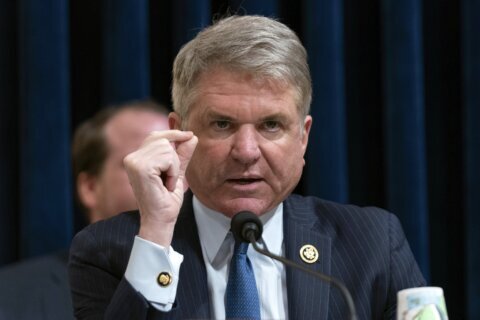▶ Watch Video: Biden says Congress must act on gun safety reforms
Washington — A bipartisan group of lawmakers met Thursday to discuss potential police reform legislation, kicking off formal negotiations the day after President Biden called on Congress to pass a bill by the end of May.
The meeting on Capitol Hill included Republican Senators Tim Scott and Lindsey Graham, Republican Representatives Pete Stauber and Brian Fitzpatrick, Democratic Senators Cory Booker and Dick Durbin, and Democratic Representatives Karen Bass and Josh Gottheimer. Some of the participants joined the meeting virtually, Bass told reporters.
Scott, Booker and Durbin each told reporters after the meeting that there had been “progress” in negotiations, but indicated that there was more the group needed to discuss.
“There’s really good momentum,” Booker said.
Bass is the lead sponsor of the George Floyd Justice in Policing Act, a comprehensive reform bill that has passed in the House but faces an uncertain future in the Senate. Most Republicans oppose a provision which would overhaul qualified immunity, making it easier to bring litigation against law enforcement officers.
The legislation was named for George Floyd, the man who was killed in May last year after a police officer pinned him down with a knee to his neck for over nine minutes. Floyd’s death sparked a wave of nationwide protests over police brutality against Black Americans and racial violence over the summer. Derek Chauvin, the officer who killed Floyd, was found guilty of murder last week.
“We have to come together to rebuild trust between law enforcement and the people they serve, to root out systemic racism in our criminal justice system, and to enact police reform in George Floyd’s name that passed the House already,” Mr. Biden said in his address before a joint session of Congress on Wednesday. “We need to work together to find a consensus. Let’s get it done next month, by the first anniversary of George Floyd’s death.”
Scott introduced his own police reform legislation last year, but it was blocked by Senate Democrats who argued that it did not go far enough. Although there are many similarities between Bass and Scott’s bills, the Republican senator’s legislation does not address qualified immunity. Scott delivered the Republican rebuttal to Mr. Biden’s speech on Wednesday evening, saying that he was “still working” to negotiate reform legislation.
Booker told reporters ahead of the bipartisan meeting that he believed that there would be progress on police reform legislation in the near future.
“You heard President Biden speak to it last night. You heard Tim Scott speak to last night. I think these are signs that there’s a will to get something meaningful that will actually make a difference, to creating more accountability and substantive reform,” Booker said.
Booker met today with members of the Floyd family and family members of Terence Crutcher, Botham Jean and Eric Garner, Black men killed by law enforcement officers in recent years. The family members then attended a meeting with Scott and Graham.
Ben Crump, an attorney for Floyd’s family, told reporters after their meeting with Scott and Graham that the two Republicans had “listened intensely” and “promised them that they were going to try to make meaningful legislation in their families’ names.”
“This was about them understanding that this is very real to all of us, but it means more to these families than anybody else because that legislation will literally have the blood stain of their loved ones,” Crump said. “And that was the tone and the tenor of the meeting. They listened a lot, and talked about how they wanted to make sure it was meaningful.”
The George Floyd Justice in Policing Act looks to end racial and religious profiling, bans chokeholds and no-knock warrants, requires deadly force be used only as a last resort after officers have employed de-escalation techniques first, limits the transfer of military-grade equipment to law enforcement agencies and would make it easier to hold officers accountable in court by limiting qualified immunity.
The measure would also change Section 242 of the U.S. Code to require a jury to decide whether a law enforcement officer acted with reckless disregard in order to convict, rather than the current standard of “willfulness.”
Bass told reporters last week that the main areas of disagreement in her informal talks with lawmakers remained Section 242 and qualified immunity.
“The main point is that we have to figure out a way to prevent these shootings from continuing to happen. And until officers are held accountable, there’s no reason to think they won’t happen, as we’ve seen over the last couple of days,” Bass said, referring to recent police shootings such as the one that killed Daunte Wright earlier this month. She said it was “essential” to retain provisions on qualified immunity and Section 242 in a proposal changing policing practices.
“I would never say that, you know, it’s my way or the highway. I would not say that. But what I will say is, those are very important. And holding officers accountable is really the bottom line,” Bass said.
Scott’s proposal is more modest than the one put forward by Democrats. The bill would require increased reporting of use of force by police officers and no-knock warrants. It would also provide grants for law enforcement to be equipped with body cameras and require departments to maintain and share officer disciplinary records. The legislation is focused heavily on police training, requiring the Justice Department to develop and provide guidelines for deescalating police encounters.
Speaker Nancy Pelosi told reporters on Thursday that she was praying that the group of lawmakers “will be successful in a very bipartisan, bicameral way.”
“We will bring it to the floor when we’re ready. And we’ll be ready when we have a good, strong, bipartisan bill,” she said.







